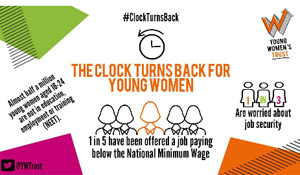Dr. Carole Easton began her career as a child and family psychotherapist in the NHS. She has extensive experience in the voluntary sector as Chief Executive of Cruse Bereavement Care, ChildLine and CLIC Sargent (caring for children with cancer). She is now Chief Executive at Young Women’s Trust, supporting and representing young women at risk of lifelong financial and emotional insecurity.

On Monday 30th November 2015 the Young Women’s Trust launched their annual report – The Clock Turns Back for Young Women in Britain. In short, despite 100 years since women first got the vote in Britain and 25 years after the equal pay, the report finds that young women today feel traditional male roles are beyond their reach. The report looks at the diminishing equality of opportunity for young women particularly in regards to work and the impact this has on their general wellbeing.
Background to the new report
Previous research conducted by the Young Women’s Trust (YWT), including findings from our Scarred for Life? Inquiry, has shown that there are more young women in the UK who are NEET, (not in education employment or training) and that double the number of young women are stuck in low paid or insecure jobs.
We have also found that high numbers of young women are filled with dread about their finances. For many the costs of housing, childcare and transport are so high they cannot afford to take low paid jobs or apprenticeships. It was against this background that YWT decided to produce an annual report which demonstrates the concerns and challenges that face young women today.
Methodology
For the first of our annual reports, The Clock Turns Back for Young Women, we commissioned a poll from ComRes which covered men and women. The sample included all socioeconomic status groups. Our analysis focused on women, 31 and over (800), and 18-30 (579).
We also conducted in-depth interviews with a selection of the young women we work with, excerpts of which were included in the report as quotes.
Key findings
Surprisingly, the poll showed that young women think that many traditionally male roles and professions are out of their reach. The roles included in the poll were: electrician, ICT technician, construction worker, care worker, nurse and plumber. In relation to every one of these occupations older women were much more likely to say that the role was equally suitable for men and women. For example 89% of older women said that an ICT technician was equally suitable, but only 65% of young women. Similarly 86% of older women said that a care worker was equally suitable, but only 63% of young women.

YWT suggests that young women’s traditional views are associated with the stubbornly gendered nature of training and work, limiting and restricting the opportunities for young women. For example only 2.7% of apprentices in construction and engineering are women, while in health, social services and children’s care, 86% are women. In STEM (science, technology, engineering and mathematics) only 13% of the workforce is female.
Similarly, some of the young women involved in our Scarred for Life? Inquiry last year, also informed us that they were being funnelled into a narrow range of careers whilst at school – primarily through being offered gendered careers advice.
How the Young Women’s Trust is supporting young women
YWT provides a free telephone and online coaching and advice service for young women struggling to find and sustain work. The service improves employability and works to improve young women’s self confidence and self-esteem, and revives their motivation to keep going despite repeated knocks. YWT is also conducting research and campaigning for changes in policy, practice and attitude.
Action needed to improve the situation and challenge stereotypes
YWT is making a number of recommendations to stop the clock going backwards and to ensure that young women can move forward again on the path of aspiration.
Employers, especially those developing large-scale projects, are encouraged to put in place recruitment and retention practices which genuinely reach out to young women. Lessons can be learned from the ‘Two Ticks’ system for disabled job candidates and the Equality and Human Rights Commission (EHRC) guidance concerning ways of recruiting under-represented groups. These include:
- Ensuring the job is advertised so that it reaches young women;
- Use positive language to encourage young women to apply. (Some phrases have been shown to discourage women from applying for jobs);
- Recruit a number of women at one time – being the only women in a man’s world can be very intimidating;
- Offer genuine and greater flexibility of working practice to those with caring responsibilities.
YWT is also campaigning for all young people to be paid at least the National Minimum wage and for the abolition of the lower rates for those on apprenticeships or under 25.
Womanthology readers can get involved in a number of ways
- Encourage the HR departments where they work to read the report and implement practice to encourage young women into less traditionally female roles
- Encourage their employers to pay all employees and apprentices the Living Wage
- Become supporters of young women in their places of work
- Support the work of Young Women’s Trust – visit www.youngwomenstrust.org and follow us on Twitter @YWTrust
http://www.youngwomenstrust.org/
https://twitter.com/caroleeaston100
https://www.facebook.com/youngwomenstrust





